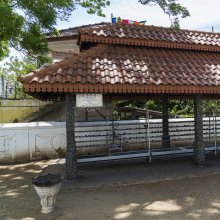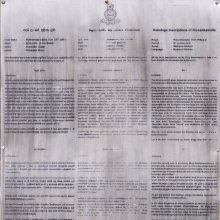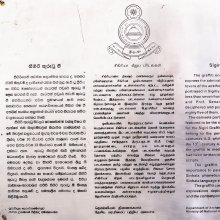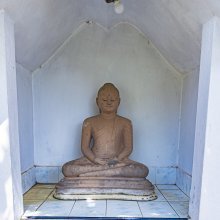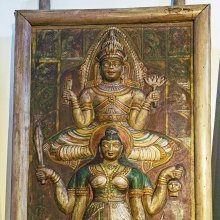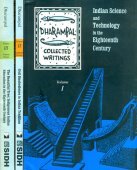Da, Ḍa: 16 definitions
Introduction:
Da means something in Hinduism, Sanskrit, Marathi, Hindi, biology. If you want to know the exact meaning, history, etymology or English translation of this term then check out the descriptions on this page. Add your comment or reference to a book if you want to contribute to this summary article.
Images (photo gallery)
(+29 more images available)
In Hinduism
Vyakarana (Sanskrit grammar)
Source: Wikisource: A dictionary of Sanskrit grammar1) Ḍa (ड).—Krt affix अ (a) applied to the root गम् (gam) preceded by अन्त, अत्यन्त, अध्वन् (anta, atyanta, adhvan) etc., as also to the roots हन् (han) and जन् (jan) under certain conditions; cf. P. III.2,48,49, 50, 97-101 and to the root क्रन् (kran) to form the word नक्र (nakra) cf. P. VI. 3.75;
2) Ḍa.—tad. affix अ (a) applied to words ending in दशन् (daśan), words ending in शत् (śat) and the word विंशति (viṃśati) in the sense of 'more than' e.g. एकादशं शतम्, एकत्रिंशम्, एकविंशम् (ekādaśaṃ śatam, ekatriṃśam, ekaviṃśam), cf P.V.2.45, 46.
--- OR ---
1) Ḍā (डा).—Verb-ending आ (ā), causing elision of the penultimate vowel as also of the following consonant, substituted for the 3rd pers. sing, affix तिप् (tip) of the first future; e.g. क्रर्ता (krartā) ; cf. P.II.4.85;
2) Ḍā.—Case ending आ (ā) substituted in Vedic Literature for any case affix as noticed in Vedic usages; e.g. नाभा पृथिव्याम्ः (nābhā pṛthivyāmḥ) cf. P. VII.1.39
--- OR ---
1) Da (द).—The consonant द् (d), the vowel अ (a) being added for facility of utterance or use;
2) Da.—A technical term used in the Jainendra Vyakarana for the term आत्मनेपद (ātmanepada) in the grammar of Panini.
--- OR ---
Dā (दा).—tad. affix named 'vibhakti' applied to the words सर्व, एक, अन्य, किं, यत्,तत् (sarva, eka, anya, kiṃ, yat, tat) and इदम् (idam) in the locative case; e.g. सर्वदा, एकदा, कदाः (sarvadā, ekadā, kadāḥ) cf. Kas. on P. V. 3.15,19,20,21.

Vyakarana (व्याकरण, vyākaraṇa) refers to Sanskrit grammar and represents one of the six additional sciences (vedanga) to be studied along with the Vedas. Vyakarana concerns itself with the rules of Sanskrit grammar and linguistic analysis in order to establish the correct context of words and sentences.
Purana and Itihasa (epic history)
Source: archive.org: Puranic EncyclopediaDa (द).—This syllable means ruin. (Agni Purāṇa, Chapter 348).

The Purana (पुराण, purāṇas) refers to Sanskrit literature preserving ancient India’s vast cultural history, including historical legends, religious ceremonies, various arts and sciences. The eighteen mahapuranas total over 400,000 shlokas (metrical couplets) and date to at least several centuries BCE.
Biology (plants and animals)
Source: Google Books: CRC World Dictionary (Regional names)1) Da in Guinea is the name of a plant defined with Hibiscus sabdariffa in various botanical sources. This page contains potential references in Ayurveda, modern medicine, and other folk traditions or local practices It has the synonym Furcaria sabdariffa Ulbr. (among others).
2) Da in Nigeria is also identified with Sorghum bicolor It has the synonym Andropogon vulgaris (Pers.) Raspail (etc.).
3) Da in Senegal is also identified with Hibiscus cannabinus It has the synonym Abelmoschus verrucosus (Guill. & Perr.) Walp. (etc.).
4) Da is also identified with Hibiscus nigrocaulis It has the synonym Hibiscus cannabinus var. radiatus (Cav.) Chiov. (etc.).
Example references for further research on medicinal uses or toxicity (see latin names for full list):
· A Handbook of the Sherbro Language. (1921)
· Bulletin de la Société Impériale des Naturalistes de Moscou (1858)
· Economic Botany (1964)
· Taxon (2000)
· Physiologia Plantarum (2005)
· FBI (1874)
If you are looking for specific details regarding Da, for example health benefits, extract dosage, side effects, diet and recipes, chemical composition, pregnancy safety, have a look at these references.

This sections includes definitions from the five kingdoms of living things: Animals, Plants, Fungi, Protists and Monera. It will include both the official binomial nomenclature (scientific names usually in Latin) as well as regional spellings and variants.
Languages of India and abroad
Marathi-English dictionary
Source: DDSA: The Molesworth Marathi and English Dictionaryḍa (ड).—a word or of a syllable) ḍa is a hard or palatal D (ḍ): finally (i. e. whether at the end of a word or of a syllable) ḍa is not a hard D, but a hard and rolling R--a sound formed by the retraction and rolling off of the tongue immediately after its appulse at the palate. This hard and rolling R is sufficiently definite and distinguishable; and it will nearly as ill bear the substitution for it in utterance of the hard and palatal D as of the soft and dental D. Dhed, kad, rad, ghad &c. are therefore erroneous representations of dhēḍa, kaḍa, raḍa, ghaḍa, and Dheṛ, kaṛ, raṛ, ghaṛ, are far more eligible. The two sounds are represented in this work respectively by ḍ and ṛ; but, as sounds are for the ear, hie thee to the speaker.
--- OR ---
ḍa (ड).—m f The sound uttered by cowherd children &c. whilst pressing the fingers against the throat. v ghāla. See ḍaha.
--- OR ---
da (द).—See the notice under त.
--- OR ---
da (द) [or दकार, dakāra].—m This letter or word appears at the head of epistles from a Shudra to a Brahman. It is to stand for daṇḍavata Salutation or obeisance. The return-letter, in epistles from a Brahman to a Shudra is ā, standing for āśīrvāda Benediction.
--- OR ---
da (द).—a (S) That gives, a donor, a giver. In comp. as sukhada, duḥkhada, mōkṣada, harṣada, śōkada, dhanada, mānada Pleasure-giving, pain-giving &c.
--- OR ---
dā (दा) [or दां, dāṃ].—ind (dā S) A particle used in conjunction with the numerals &c., signifying time or times. Ex. ēkadā Once; bahutadā Many times; kitīdā How many times? Also pahilyāndā At the first time; dusaṛyāndā, tisaṛyāndā, cavathyāndā &c. and pahilyēndā, dusaṛyēndā &c.
Source: DDSA: The Aryabhusan school dictionary, Marathi-Englishḍa (ड).—The thirteenth consonant.
--- OR ---
da (द).—The 18th consonant. a That gives, a donor, a giver. In comp. as sukhada.
--- OR ---
dā (दा) [or dāṃ, or दां].—A particle used in conjunction with the numerals &c. signifying time or times. Ex. ēkadā, bahutadā, kitīdā.
--- OR ---
da (द).—or -
--- OR ---
ḍā (डा).—f -
--- OR ---
da (द).—or -
--- OR ---
ḍā (डा).—or -
--- OR ---
ḍa (ड).—or-
--- OR ---
dā (दा).—or-
--- OR ---
da (द).—or-
Marathi is an Indo-European language having over 70 million native speakers people in (predominantly) Maharashtra India. Marathi, like many other Indo-Aryan languages, evolved from early forms of Prakrit, which itself is a subset of Sanskrit, one of the most ancient languages of the world.
Sanskrit dictionary
Source: DDSA: The practical Sanskrit-English dictionaryḌa (ड).—1 A sound.
2) A kind of drum or tabor.
3) Submarine fire.
4) Fear.
5) An epithet of Śiva.
-ḍā 1 A kind of female imp (ḍākinī).
2) A basket carried by means of a sling.
Derivable forms: ḍaḥ (डः).
--- OR ---
Ḍa (ड).—1 P. (ḍamati) To sound.
Derivable forms: ḍam (डम्).
--- OR ---
Da (द).—a. (At the end of comp.) Giving, granting, producing, causing, cutting off, destroying, removing; as धनद, अन्नद, गरद, तोयद, अनलद (dhanada, annada, garada, toyada, analada) &c.
-daḥ 1 A gift, donation.
2) A mountain.
-dam A wife.
-dā 1 Heat.
2) Repentance.
--- OR ---
Da (द).—4 P. (dāmyati, damita, dānta)
1) To be tamed.
2) To be calm or tranquil; Manusmṛti 4.35;6.8;7.141.
3) To tame, subdue, conquer, restrain; यमो दाम्यति राक्षसान् (yamo dāmyati rākṣasān) Bhaṭṭikāvya 18.29; दमित्वाप्यरिसंघातान् (damitvāpyarisaṃghātān) 9.42,19;15.37.
4) To pacify. -Caus. (damayati-te)
1) To tame.
2) To subdue, conquer, overpower; अस्त्वयं सर्वदमनः सर्वं हि दमयत्यसौ (astvayaṃ sarvadamanaḥ sarvaṃ hi damayatyasau) Mahābhārata (Bombay) 1.74.8.
3) To afflict, crush down; अतिभारेण दमयति (atibhāreṇa damayati) Pañcatantra (Bombay) 4.
Derivable forms: dam (दम्).
--- OR ---
Dā (दा).—I. 1 P. (yacchati, datta] To give, grant. -With prati to exchange; tilebhyaḥ pratiyacchati māṣān Sk. -II. 2. P. (dāti) To cut; ददाति द्रविणं भूरि दाति दारिद्र्यमर्थिनाम् (dadāti draviṇaṃ bhūri dāti dāridryamarthinām) K. R. -III. 4 P. (dāyati) To bind (?). -IV. 3 U. (dadāti, datte; dadau-dade, adāt-adita, dāsyati-te, dātum, datta; but with ā the p. p. is ātta; with upa, upātta; with ni, nidatta or nītta, and with pra, pradatta or pratta)
1) To give, grant, bestow, offer, yield, impart, present (usually with acc. of the thing and dat., sometimes gen. or loc. also, of the person); अवकाशं किलोदन्वान् रामायाभ्यर्थितो ददौ (avakāśaṃ kilodanvān rāmāyābhyarthito dadau) R.4.58; सेचनघटैः बालपादपेभ्यः पयो दातुमित एवाभिवर्तते (secanaghaṭaiḥ bālapādapebhyaḥ payo dātumita evābhivartate) Ś.1; Manusmṛti 3.31;9.271; कथमस्य स्तनं दास्ये (kathamasya stanaṃ dāsye) Hariv.
2) To pay (as debt, fine &c.).
3) To hand or deliver over.
4) To restore, return.
5) To give up, sacrifice, surrender; प्राणान् दा (prāṇān dā) to sacrifice one's life; so आत्मानं दा (ātmānaṃ dā) to sacrifice oneself.
6) To put, place, apply, plant कर्णे करं ददाति (karṇe karaṃ dadāti) &c.
7) To give in marriage; यस्मै दद्यात् पिता त्वेनाम् (yasmai dadyāt pitā tvenām) Manusmṛti 5. 151; Y.2.146;3.24.
8) To allow, permit (usually with inf.); बाष्पस्तु न ददात्येनां द्रष्टुं चित्रगतामपि (bāṣpastu na dadātyenāṃ draṣṭuṃ citragatāmapi) Ś.6.22. (The meanings of this root may be variously modified or extended according to the noun with which it is connected; mano dā to think, direct the mind to anything; nītau mano dīyate Mu.2.5; avakāśaṃ dā to give place to, make room; (see avakāśa); कर्णं दा (karṇaṃ dā) to give ear to or listen; दर्शनं दा (darśanaṃ dā) to show oneself to, grant audience to; शब्दं दा (śabdaṃ dā) to make a noise; तालं दा (tālaṃ dā) to clap the hands; आत्मानं खेदाय दा (ātmānaṃ khedāya dā) to expose oneself to trouble; आतपे दा (ātape dā) to expose to the sun's heat; आज्ञाम्, निदेशं दा (ājñām, nideśaṃ dā) to issue orders, command; आशिषं दा (āśiṣaṃ dā) to pronounce a blessing; चक्षुः, दृष्टिं दा (cakṣuḥ, dṛṣṭiṃ dā) to cast a glance, see; वाचं दा (vācaṃ dā) to address a speech to; प्रतिवचः, -वचनं (prativacaḥ, -vacanaṃ) or प्रत्युत्तरं दा (pratyuttaraṃ dā) to give reply; शोकं दा (śokaṃ dā) to cause grief; श्राद्धं दा (śrāddhaṃ dā) to perform a Śrāddha; मार्गं दा (mārgaṃ dā) to make way for, allow to pass, stand out of the way; वरं दा (varaṃ dā) to grant a boon; संग्रामं दा (saṃgrāmaṃ dā) to fight; अर्गलं दा (argalaṃ dā) to bolt, fasten or secure with a latch; निगडं दा (nigaḍaṃ dā) to put in chains, fetter; संकेतं दा (saṃketaṃ dā) to make an appointment; शापं दा (śāpaṃ dā) to curse; वृत्तिं दा (vṛttiṃ dā) to enclose, fence in; अग्निं, पावकं दा (agniṃ, pāvakaṃ dā) to set on fire, &c. &c. -Caus (dāpayati-te) To cause to give, grant, &c. -Desid. (ditsati-te) To wish to give, &c.
--- OR ---
Dā (दा).—
1) Protection, defence.
2) Cleaning, purifying.
Source: Cologne Digital Sanskrit Dictionaries: Shabda-Sagara Sanskrit-English DictionaryḌa (ड).—The third letter of the cerebral class of consonants, having the sound of D, pronounced far back in the “head”: it is often confounded in pronounciation with a hard R, or L, sounded as in the Northumbrian bur; it is written in the Roman character D.
--- OR ---
Ḍa (ड).—m.
(-ḍaḥ) 1. A name of Siva. 2. Fear. 3. Sound. 4. Submarine fire. 5. A kind of drum or tabor. 6. A kind of bird. f.
(-ḍā) 1. A kind of female imp or goblin. 2. A basket, &c. carried by a sling: see ḍalaka. E. ḍapa tocollect, affix, ḍa.
--- OR ---
Da (द).—The third letter of the dental class, and eighteenth consonant in the Deva Nagari alphabet, corresponding to the letter D.
--- OR ---
Da (द).—n.
(-daṃ) A wife. nf. (daṃdā) 1. Gift, donation. 2. Dividing, cutting, breaking, &c. f. (dā) 1. Purifying, cleansing. 2. Preserving, cherishing. 3. Repentance. m. (daḥ) 1. A donor, a giver. 2. A mountain. 3. A gift, a thing given. E. dā to give, or do to cut, &c. affix ḍa.
--- OR ---
Dā (दा).—[(ṇa) dāṇa] r. 1st cl. (yacchati, or with sam prefixed saṃyacchate) also (ḍu ña) ḍudāñ r. 3rd cl. (dadāti datte) To give, to present. With āṅ prefixed (ādatte), To take, to accept or receive. With pra, To give, to give to, With vi and āṅ, To open. With sam and āṅ, To select. (pa) dāp r. 2nd cl. (dāti) To cut. bhvā0 pa0 saka0 seṭ ṇa it . juho0 ubha0 saka0 seṭ .
Source: Cologne Digital Sanskrit Dictionaries: Benfey Sanskrit-English DictionaryDa (द).—[-da], latter part of compound words, I. (vb. 1. dā), Giving, e. g. aśva-, adj. Giving a horse, [Mānavadharmaśāstra] 4, 231. go- 1. adj. Giving cattle, [Mānavadharmaśāstra] 4, 231. 2. f. dā, The name of a river, [Raghuvaṃśa, (ed. Stenzler.)] 13, 35 (anu-goda + m, compounded adverb, Along the Godā). janmada, i. e. janman-, m. A father, [Śākuntala, (ed. Böhtlingk.)] [distich] 177, v. r. sahasra-, adj. Giving, or one who has given, a thousand (cows), [Mānavadharmaśāstra] 3, 186. Ii. (vb. 2. dā), 1. Destroying, cf. e. g. anala-, adj. Quenching fire. māna-, adj. Destroying arrogance (or from I. pride-inspiring),
--- OR ---
Dā (दा).—ii. 3, [Parasmaipada.], [Ātmanepada.] 1. To give, [Mānavadharmaśāstra] 3, 31. 2. To grant, to bestow, [Harivaṃśa, (ed. Calc.)] 5709; [Hitopadeśa] pr. [distich] 2. 3. To marry, Mahābhārata 1, 6526. 4. To sell, with the instr. of the price, [Rāmāyaṇa] 1, 53, 8. 5. To deliver, [Mānavadharmaśāstra] 8, 234. 6. To return, [Mānavadharmaśāstra] 8, 222. 7. To pay, [Mānavadharmaśāstra] 8, 154. 8. With talam, or talān, To shake hands, [Harivaṃśa, (ed. Calc.)] 15741; Mahābhārata 3, 14819. 9. To offer, [Mānavadharmaśāstra] 9, 136. 10. To communicate, to teach, [Mānavadharmaśāstra] 2, 114. 11. With ātmānam, To sacrifice one’s self, [Kathāsaritsāgara, (ed. Brockhaus.)] 22, 227. 12. With many words it has the signification of Doing, performing, [Caurapañcāśikā] 35; with anuyātrām, To accompany, [Kathāsaritsāgara, (ed. Brockhaus.)] 18, 197; with tālam, To beat the time, Mahābhārata 1, 5939. 13. To cause, [Rāmāyaṇa] 2, 53, 21. 14. To allow, Mahābhārata 1, 1528 (with infin.). 15. To put, [Mṛcchakaṭikā, (ed. Stenzler.)] 139, 8; cf. ardhacandra. 16. With śāram, To draw, [Daśakumāracarita] in
— Anomalous 1. sing. pr. par. dadmi, Mahābhārata 12, 10466; 3. sing. dadati, 3, 13422; 3. pl. dadanti, 13, 3148; 3. sing. impf. adadat, 2, 1880; 2. sing. imptive. dada, 9, 2442; [Ātmanepada.] dadasva, 1, 3482; cf. dad.
— Ptcple. of the pf. pass. datta, m. 1. A given son, [Mānavadharmaśāstra] 9, 159. 2. A proper name. 3. n. Giving [Bhāgavata-Purāṇa, (ed. Burnouf.)] 1, 5, 22. Comp. Svayam-, adj. self-given. m. a child who has given himself to adoptive parents, [Mānavadharmaśāstra] 9, 177. Comp. ptcple. of the fut. pass. a-deya, What ought not to be given,
— With the prep. anu anu, To leave(?), Mahābhārata 7, 9499.
— With abhi abhi, To give, Mahābhārata 3, 13309.
— With ā ā, [Ātmanepada.] (in epic poetry also [Parasmaipada.], Mahābhārata 2, 2637), 1. To take, [Mānavadharmaśāstra] 4, 223. 2. To receive, [Mānavadharmaśāstra] 2, 238; with garbham, To become pregnant, [Draupadīpramātha] 5, 9 (and To rob). 3. To take away, [Mānavadharmaśāstra] 7, 124. 4. To impair, [Mānavadharmaśāstra] 4, 218. 5. To carry with one’s self, [Mānavadharmaśāstra] 9, 92. 6. To seize, Mahābhārata 4, 1113. 7. To perceive, Mahābhārata 14, 675. 8. To agree, [Rāmāyaṇa] 2, 90, 16. 9. To undergo, [Bhāgavata-Purāṇa, (ed. Burnouf.)] 2, 3, 15. Ptcple. of the pf. pass. I. ātta, 1. Seized, Mahābhārata 6, 5592. 2. Robbed, [Rāmāyaṇa] 2, 61, 18. 3. Undertaken, [Kathāsaritsāgara, (ed. Brockhaus.)] 21, 142. Ii. ā-datta, Taken away, [Harivaṃśa, (ed. Calc.)] 11811. ādeya, 1. What ought to be received, [Mānavadharmaśāstra] 8, 171. 2. To be approved, [Rājataraṅgiṇī] 5, 274. an-ādeya, What ought not to be taken, ib. Absol. ādāya, very often With, [Rāmāyaṇa] 3, 42, 30. Desider. To be about to seize, [Daśakumāracarita] in
— With abhyā abhi-ā, [Ātmanepada.] ([Parasmaipada.], [Harivaṃśa, (ed. Calc.)] 14602), 1. To take away, Mahābhārata 1, 3558. 2. To put on, [Harivaṃśa, (ed. Calc.)] 13086. 3. To begin, Mahābhārata 5, 3384.
— With udā ud-ā, udātta, Prominent, [Rāmāyaṇa] 2, 100, 10; [Prabodhacandrodaya, (ed. Brockhaus.)] 97, 1. m. The acute accent. n. An ornament (in rhetoric), Sāh. D. 752. Comp. An-, m. The grave accent.
— With upā upa-ā, [Ātmanepada.] 1. To receive, Mahābhārata 3, 8537. 2. To acquire, Mārk. P. 21, 93. 3. To take away, Mahābhārata 3, 8599. 4. To take, Mahābhārata 3, 1553. 5. To gather, [Rāmāyaṇa] 3, 13, 18. 6. To assume, [Bhāgavata-Purāṇa, (ed. Burnouf.)] 1, 9, 10. 7. To consider, Mahābhārata 12, 427. 8. To begin, [Rāmāyaṇa] 5, 81, 32. Absol. upādāya, 1. With, Mahābhārata 3, 3028. 2. Inclusively, [Rāmāyaṇa] 2, 92, 6. 3. By means of, Mahābhārata 4, 1775. Desider. To wish to acquire, [Bhāgavata-Purāṇa, (ed. Burnouf.)] 5, 14, 7 ([Parasmaipada.]).
— With abhyupā abhi-upa-ā, To gather, Mahābhārata 12, 167.
— With samupā sam-upa-ā, 1. To take, [Rāmāyaṇa] 2, 25, 25. 2. To acquire, Mārk. P. 21, 95. 3. To rob, Mahābhārata 3, 11676. 4. To collect, [Rāmāyaṇa] 2, 32, 35 Gorr. 4. To put on, Mahābhārata 1, 6974.
— With paryā pari-ā, [Ātmanepada.] 1. To take off, [Suśruta] 2, 36, 2. 2. To seize, Mahābhārata 5, 1940. 3. To learn, Mahābhārata 12, 3256.
— With prā pra-ā, To deliver, Mahābhārata 1, 4899.
— With pratyā prati-ā, [Ātmanepada.] 1. To get back, Mahābhārata 12, 7415. 2. To take back, to rescind, Mahābhārata 1, 785.
— With vyā vi-ā, [Parasmaipada.] 1. To open wide, [Harivaṃśa, (ed. Calc.)] 16003. 2. To gape, [Bhāgavata-Purāṇa, (ed. Burnouf.)] 3, 16, 14. Ptcple. of the pf. pass. vyātta, and anomalous vyādita, Wide-opened, Mahābhārata 3, 2024; 2, 946.
— With samā sam -ā, I. [Parasmaipada.] 1. To give, [Harivaṃśa, (ed. Calc.)] 16367. 2. To return, [Bhāgavata-Purāṇa, (ed. Burnouf.)] 9, 17, 15. Ii. [Ātmanepada.] (also [Parasmaipada.], [Bhāgavata-Purāṇa, (ed. Burnouf.)] 8, 10, 43), 1. To take up, [Mānavadharmaśāstra] 6, 4. 2. To take away, [Mānavadharmaśāstra] 3, 219. 3. To seize, [Rāmāyaṇa] 3, 32, 5. 4. To begin, Mahābhārata 5, 26. 5. To take to mind, [Bhāgavata-Purāṇa, (ed. Burnouf.)] 3, 23, 24.
— With ud ud, To snatch away, [Bhāgavata-Purāṇa, (ed. Burnouf.)] 3, 1, 39.
— With upa upa, To give, [Rāmāyaṇa] 1, 50, 9 Gorr.
— With kad kad, To reproach, [Bhāgavata-Purāṇa, (ed. Burnouf.)] 7, 5, 28.
— With parā parā, To exclude, [Bhāgavata-Purāṇa, (ed. Burnouf.)] 4, 6, 5.
— With pari pari, [Parasmaipada.], [Ātmanepada.] 1. To deliver, [Mānavadharmaśāstra] 9, 327. 2. To grant, [Bhāgavata-Purāṇa, (ed. Burnouf.)] 3, 5, 50. [Causal.] To cause to be delivered, Mahābhārata 15, 445.
— With pra pra, [Parasmaipada.] ([Ātmanepada.], Naiṣ. 6, 95), 1. To give, [Mānavadharmaśāstra] 9, 118; to communicate, Mahābhārata 1, 103. 2. To grant, [Rāmāyaṇa] 1, 62, 26. 3. To give in marriage, [Mānavadharmaśāstra] 8, 204. 4. To sell, [Pañcatantra] i. [distich] 17. 5. To pay, [Yājñavalkya, (ed. Stenzler.)] 2, 90. 6. To make good, [Mānavadharmaśāstra] 8, 232. 7. To put, [Yājñavalkya, (ed. Stenzler.)] 1, 236. Ptcple. of the pf. pass. pratta and pradatta, Given, etc., [Pañcatantra] 25, 4; 63, 22. Comp. A-pratta, adj. of which nothing is given away before (eating it), [Bhāgavata-Purāṇa, (ed. Burnouf.)] 5, 26, 18. [Causal.] 1. To compel to return, [Yājñavalkya, (ed. Stenzler.)] 2, 270. 2. To cause to put in, Mahābhārata 1, 5723. Desider. To wish to give in marriage, [Daśakumāracarita] in
— With pratipra prati-pra, To return, Mahābhārata 5, 5525.
— With saṃpra sam-pra, 1. To deliver, [Rāmāyaṇa] 2, 32, 23. 2. To grant, Mahābhārata 1, 3346. 3. To give in marriage, [Harivaṃśa, (ed. Calc.)] 11006 (p. 790). [Causal.] To order to be given, [Rāmāyaṇa] 2, 32, 16.
— With prati prati, 1. To return,
— With vi vi, to divide, [Rāmāyaṇa] 1, 13, 39 Gorr.
— With sam sam, To grant, Mahābhārata 7, 2618.
— Cf. ([Causal.]); [Latin] dare.
--- OR ---
Dā (दा).—ii. 2 [Parasmaipada.], and do Do, i. 4, dya, [Parasmaipada.] To cut. Ptcple. of the pf. pass. dita, Cut off, [Bhāgavata-Purāṇa, (ed. Burnouf.)] 6, 6, 23.
— With the prep. ava ava, To cut off, [Bhāgavata-Purāṇa, (ed. Burnouf.)] 5, 26, 31.
— With vi vi, To cut, to destroy, [Harivaṃśa, (ed. Calc.)] 8435 (anomal. absolut. vi-ditya).
— Cf. day; ([Causal.]), [Latin] daps.
--- OR ---
Dā (दा).—i. 4, dya, To bind (ved.).
— With the prep. sam sam, ptcple. of the pf. pass. saṃdita, Tied, [Harivaṃśa, (ed. Calc.)] 3674.
— Cf. perhaps also
Source: Cologne Digital Sanskrit Dictionaries: Cappeller Sanskrit-English DictionaryDa (द).—1. (—°) giving, granting, causing.
--- OR ---
Da (द).—2. (—°) cutting off, destroying.
--- OR ---
Dā (दा).—1. dadāti datte dadati dadate (dāti) (dadmi) [participle] datta (q.v.) give, grant, bestow, impart ([with] [accusative] or partit. [genetive] of th., [genetive] or [locative] of [person or personal]), give in marriage (±bhāryām), give back, restore (±punar); pay (ṛṇam); open *(dvāram); deliver up, hand over (±haste); make over, surrender; concede, allow, permit; give away, sell ([instrumental] of price); offer, sacrifice; communicate, teach, pronounce; put in or on, turn to ([locative]); [with] pāvakam set fire to ([locative]); [with] agnīn burn ([dative]); do, make, cause, perform, bring about. [Middle] receive, carry, bear, keep, guard from ([ablative]). [Causative] dāpayati cause to give, grant, etc. (1 or 2 [accusative]), make pay (2 [accusative]), demand from ([ablative]); put in or on ([locative]).* [Desiderative] ditsati, te, didāsati wish or be ready to give.
--- OR ---
Dā (दा).—2. [masculine] giver; often —° giving, granting.
--- OR ---
Dā (दा).—3. dāti dyati [participle] dina & dita cut, mow.
--- OR ---
Dā (दा).—4. dyati [participle] dita (only —°) bind.
--- OR ---
Dā (दा).—5. [participle] dāta (—°) clean, purify. — Cf. avadāta.
Source: Cologne Digital Sanskrit Dictionaries: Monier-Williams Sanskrit-English Dictionary1) Ḍa (ड):—1. ḍa the 3rd cerebral consonant (pronounced like d in drum by slightly turning the tip of the tongue upwards ; and often in Bengal like a hard r).
2) 2. ḍa m. a sound, [cf. Lexicographers, esp. such as amarasiṃha, halāyudha, hemacandra, etc.]
3) a kind of drum, [Horace H. Wilson]
4) fear, [cf. Lexicographers, esp. such as amarasiṃha, halāyudha, hemacandra, etc.]
5) submarine fire, [cf. Lexicographers, esp. such as amarasiṃha, halāyudha, hemacandra, etc.]
6) Śiva, [cf. Lexicographers, esp. such as amarasiṃha, halāyudha, hemacandra, etc.]
7) Ḍā (डा):—[from ḍa] f. a Ḍākinī, [cf. Lexicographers, esp. such as amarasiṃha, halāyudha, hemacandra, etc.]
8) [v.s. ...] a basket etc. carried by a sling, [cf. Lexicographers, esp. such as amarasiṃha, halāyudha, hemacandra, etc.]
9) Da (द):—1. da the 3rd and soft letter of the 4th or dental class.
10) 2. da mf(ā)n. (√1. dā) ifc. ([Pāṇini 3-2, 3]) giving, granting, offering, effecting, producing (e.g. abhīṣṭa-, ‘giving any desired object’ [Pañcatantra ii, 50]; gaja-vāji-vṛddhi-, ‘promoting the welfare of elephants and horses’ [Varāha-mihira’s Bṛhat-saṃhitā xviii, 5]), [Manu-smṛti; Mahābhārata] etc. (cf. agni-; a-doma-da; anna-,artha-,garbha-,janmaetc.)
11) m. n. a gift, [cf. Lexicographers, esp. such as amarasiṃha, halāyudha, hemacandra, etc.]
12) Dā (दा):—[from da] a f. idem, [cf. Lexicographers, esp. such as amarasiṃha, halāyudha, hemacandra, etc.]
13) Da (द):—3. da mfn. (√do) ifc. See anala-, 2. jīva-
14) m. n. the act of cutting off, [cf. Lexicographers, esp. such as amarasiṃha, halāyudha, hemacandra, etc.]
15) Dā (दा):—[v.s. ...] b f. idem, [cf. Lexicographers, esp. such as amarasiṃha, halāyudha, hemacandra, etc.]
16) Da (द):—4. da mfn. (√4. da-) ifc. See ṛśya-da.
17) 5. da = dat cf. a-panna-, panna-
18) [ṣo-ḍa].
19) 6. da m. a mountain, [cf. Lexicographers, esp. such as amarasiṃha, halāyudha, hemacandra, etc.]
20) n. a wife (derived [from] dam-patī), [cf. Lexicographers, esp. such as amarasiṃha, halāyudha, hemacandra, etc.]
21) Dā (दा):—[v.s. ...] c f. heat, pain, [cf. Lexicographers, esp. such as amarasiṃha, halāyudha, hemacandra, etc.]
22) 1. dā [class] 3. dadāti ([plural] dati, [Ṛg-veda] etc.; [Ātmanepada] datte, [Pañcatantra i, 4, 19/20 12, 7; Subhāṣitāvali]; 1. sg. dadmi, [Mahābhārata xii; Harivaṃśa; Rāmāyaṇa i f.]; [imperative] dadātu [plural] dahu; 2. sg. daddhi, [Ṛg-veda i f.; iv, vi, viii, x]; dehi [Pāṇini 6-4, 119] [Ṛg-veda iii f., viii, x; Atharva-veda v, xviii f. etc.] ; 2. [plural] dadāta, [Ṛg-veda vii, 57, 6], tana, [x, 36, 10], datta, [51, 8; Vājasaneyi-saṃhitā; Atharva-veda] etc.; 2. [dual number] ttam, [Ṛg-veda i, 34, 6; Atharva-veda] etc.; [Potential] dadyāt, [Atharva-veda] etc.; [imperfect tense] adadāt; [plural] adadur, [Ṛg-veda vi, x; Atharva-veda v, 18, 1]; 2. [dual number] adattam, [Ṛg-veda] etc.; 2. [plural] ttana, [i 139, 7], adadāta, [x, 64, 12]; [subjunctive] dadat, [ii, v, vii f., x], das, [vii f.] dan, [Atharva-veda vi, 24, 1] p. m. [nominative case] sg. dadat [plural] tas, [Ṛg-veda] etc.; p. [Ātmanepada] dadāna, [v, 33, 9]; na, [i. 148, 2; v, 2, 3]; sg. dadati, [ii, 35, 10; Mahābhārata iii, 13422]; [plural] danti, [xii f.]; [imperative] da, [ix; Mārkaṇḍeya-purāṇa]; data, [Siṃhāsana-dvātriṃśikā or vikramāditya-caritra, jaina recension]; [Potential] det, [Parāśara-smṛti vi, 19]; [imperfect tense] adadat, [Atharva-veda xii, 4, 23; Mahābhārata; Rāmāyaṇa]; [Ātmanepada] sg. dadate, [Ṛg-veda i, 24, 7; Atharva-veda x, 8, 36]; [plural] dante, [35; Vājasaneyi-saṃhitā viii, 31]; [imperative] sg. datām, [Ṛg-veda iii, 53, 17]; dasva, [Mahābhārata; Harivaṃśa] etc.; [imperfect tense] [plural] adadanta, [Ṛg-veda vii, 33, i i; Atharva-veda xiv]; p. dadamāna, [Ṛg-veda i, 41, 9; iv, 26, 6]; [Aorist] adāt [Pāṇini 2-4, 77], dat, adur, dur etc.; [subjunctive] 2. [dual number] dāsathas, [Ṛg-veda viii, 40, 1] cf. [Naighaṇṭuka, commented on by Yāska ii, 30]; [Potential] 1. [plural] deṣma, [Vājasaneyi-saṃhitā ii, 32]; [perfect tense] dadau, dur, dathur, datur, do, [Ṛg-veda] etc.; [Passive voice] de, [iv, 34 & 37; Atharva-veda; x, 2, 16]; dadade, dāte, dire, [Pāṇini 6-4, 126; Kāśikā-vṛtti]; p. [genitive case] daduṣas, [Ṛg-veda i, viii], ṣām, [vi]; [nominative case] dvān, [x, 132, 3]; dāvan, [Atharva-veda v, 11, 1]; [accusative] divāṃsam, [ix, 5, 10] cf. [Vopadeva xxvi, 133]; [future] p. dāsyat, [Atharva-veda vi, 71, 3]; [Ātmanepada] syate, syante, 1. sg. sye, [Mahābhārata; Harivaṃśa; Rāmāyaṇa; Mārkaṇḍeya-purāṇa]; Prec. deyāt, [Pāṇini 6-4, 67]; [infinitive mood] dāvane, [Ṛg-veda]; dātos, [vii, 4, 6]; tave, [vii-ix; Atharva-veda iii, 20, 5]; dātavai [Pāṇini vi, 1, 200; Siddhānta-kaumudī] [Ṛg-veda iv, 21, 9]; tum, [v; Atharva-veda] etc.: [indeclinable participle] dattvāya [Pāṇini 7-1, 47; Kāśikā-vṛtti] [Ṛg-veda x, 85, 33]; ttvā, [Atharva-veda] etc.; -dāya [Pāṇini 6-4, 69] [Ṛg-veda] etc.:—[Passive voice] dīyate [Pāṇini 6-4, 62]; p. yamāna, [Atharva-veda ix]; [Aorist] adāyi, [Pāṇini 7-3, 33; Kāśikā-vṛtti]; Prec. dāsīṣṭa, dāyis, [vi, 4, 62]) [class] 1. dāti ([Ṛg-veda iv-vii]; [imperative] tu, [15, 11]; cf. [Pāṇini 6-1, 8], [vArttika] 3, [Patañjali; ii, 4, 76; Kāśikā-vṛtti])
—to give, bestow, grant, yield, impart, present, offer to ([dative case], in later language also [genitive case] or [locative case]), [Ṛg-veda] etc.;
—to give (a daughter, kanyām) in marriage, [Manu-smṛti v, ix; Yājñavalkya; Mahābhārata] etc.;
—to hand over, [Manu-smṛti viii, 186 & 234];—(with haste), [Kathāsaritsāgara];
—to give back, [222 f.; Mahābhārata iii; Pañcatantra; Viṣṇu-purāṇa; Kathāsaritsāgara lxxiv];
—to pay (daṇḍam, ‘a fine’ [Manu-smṛti viii f.]; ṛṇam, ‘a debt’, [viii; Yājñavalkya ii, 45]);
—to give up, cede (āsanam, ‘one’s seat’), [Manu-smṛti iv, 54];—(panthānam or mārgam, ‘to give up the road, allow to pass’), [viii, 275] and, [Rāmāyaṇa v, 94, 8];
—to sell (with [instrumental case] of the price), [i; Nalopākhyāna xiv, 21; Varāha-mihira’s Bṛhat-saṃhitā xlii, 11];
—to sacrifice (ātmānam, ‘one’s self.’ [Kathāsaritsāgara xxii, 227]; āt khedāya, ‘to give one’s self up to grief’, [v, 57]);
—to offer (an oblation etc.), [Manu-smṛti; Yājñavalkya; Rāmāyaṇa] etc.;
—to communicate, teach, utter (blessings, āśiṣas, [Śakuntalā; Mārkaṇḍeya-purāṇa]), give (answer, prati-vacas, canam, praty-uttaram, [Nalopākhyāna; Śakuntalā] etc.), speak (satyaṃ vacas, the truth, [Yājñavalkya ii, 200]; vacam, to address a speech to [dative case] [Śakuntalā vi, 5]);
—to permit, allow (with [infinitive mood]), [Mahābhārata i; Śakuntalā vi, 22];
—to permit sexual intercourse, [Śatapatha-brāhmaṇa xiv, 9, 4, 7];
—to place, put, apply (in med.), [Manu-smṛti; Yājñavalkya; Mahābhārata] etc.;
—to add, [Pañcatantra ii, 6, 5; Sūryasiddhānta; Varāha-mihira’s Bṛhat-saṃhitā; Laghujātaka, by Varāha-mihira];—with varam, ‘to grant a boon’ [Śatapatha-brāhmaṇa xi; Kātyāyana-śrauta-sūtra; Mahābhārata] etc.;—śoham, ‘to cause grief’, [xiii; Rāmāyaṇa ii];—avakāśam, ‘to give room or space, allow to enter’ [Yājñavalkya ii, 276; Mṛcchakaṭikā; Raghuvaṃśa] etc.;—prāṇān or jīvitam, ‘to spare any one’s life’ [Mahābhārata; Kathāsaritsāgara xviii, 275];
— talam or lān, to slap with the palms of the hands, [Mahābhārata iii, ix; Harivaṃśa 15741];
— la-prahāram, to strike with the palm, [Pañcatantra; iv,. 2, 0/1] tālam, to beat time with the hands, [Mahābhārata i; Bhaṭṭi-kāvya];
— saṃjñām, to make a sign, [Mṛcchakaṭikā];
— saṃketakam, to make an appointment, [Pañcatantra ii, 4, 3/4] samayam, to propose an agreement, [Kathāsaritsāgara xviii, 139];
— upamām, to compare with [genitive case] [Cāṇakya];
— paṭaham, to proclaim with the drum, [Kathāsaritsāgara lxxiii, 357];
— śabdam, to make a noise, call out, [Vetāla-pañcaviṃśatikā iv, 2/3];
— śāpam, to utter a curse, [Mahābhārata; Rāmāyaṇa] etc.;—gālīḥ. idem, [Bhartṛhari];
— anuyātram, to accompany, [Kathāsaritsāgara xviii, 197];
— āliṅganane, parirambhaṇam, to embrace, [209; Gīta-govinda iii, 8];
— jhampam, to jump, [Hitopadeśa];
— śrāddham, to perform a Śrāddha, [Mahābhārata xiv; Rāmāyaṇa ii];
— vratakam, to accomplish a vow, [Harivaṃśa];
— yuddham, niy, saṃgrāmam, to give battle, fight with, [Mahābhārata; Harivaṃśa; Rāmāyaṇa];
— ājñām ādeśam, to give an order, command, [i; Brahma-purāṇa; Vetāla-pañcaviṃśatikā];
— saṃdeśam, to give information, [Kathāsaritsāgara xvii, 161];
— prayogam, to give a dramatic representation, [Mālavikāgnimitra i, 12/13] vṛtim, to fence in [Manu-smṛti viii, 240; Manvarthamuktāvalī, kullūka bhaṭṭa’s Commentary on manu-smṛti];
— darśanam, to show one’s self, [Prabodha-candrodaya iii, 0/1];
— dṛṣṭim, dṛśam, akṣi, caksus, to fix the eyes on ([locative case]), [Śakuntalā i, 6; Kathāsaritsāgara; Dhūrtasamāgama; Śṛṅgāra-tilaka; Sāhitya-darpaṇa];
— karṇam, to give ear, listen, [Śakuntalā; Kathāsaritsāgara];
— manas, to direct the mind to ([locative case]), [Mahābhārata xii, 2526];
— kare kapolam, to rest the cheek on the hand, [Kāraṇḍa-vyūha xviii, 73] ;—nigaḍāni to put on or apply fetters, [Mṛcchakaṭikā vii, 6/7] pāvakam, to set on fire;—agnīn to consume by fire, [Manu-smṛti v, 168];
— śāram, to move a chess-man, [Daśakumāra-carita vii, 137];
— argalam, to draw a bolt, bar, [Kathāsaritsāgara; Rājataraṅgiṇī vi, 96];
— jānu, to kneel upon ([genitive case]), [Mahābhārata iii f.];
— padam, to tread upon [loc.] [Bhartṛhari; Hitopadeśa ii, 12, 25; Saṃkṣepa-śaṃkara-vijaya i, 38];
—to direct the steps, [Amaru-śataka 74];
— viṣam, to poison, [Pañcarātra i, 14, 80] (with [accusative]!);—garam idem, [Viṣṇu-purāṇa iv, 3, 16] (with [genitive case]);—— [Ātmanepada] to carry, hold, keep, preserve, [Ṛg-veda; Atharva-veda; Vājasaneyi-saṃhitā];
—to show, [Sāma-veda i, 2, 1, 4, 7] ([Aorist] adadiṣṭa; aded [from] √diś, [Ṛg-veda]) :—[Causal] dāpayati ([Pāṇini vii, 3, 36]; [Aorist] adīdapat, [4, 1 and 58; Kāśikā-vṛtti])
—to cause to give or be given, cause to bestow or present or give up, oblige to pay, make restore, [Vājasaneyi-saṃhitā ix, 24; Atharva-veda iii, 20, 8; Manu-smṛti] etc.;
—to demand from ([ablative]), [Manu-smṛti viii, 47];
—to cause to utter or speak, [Harivaṃśa 15782; Yājñavalkya ii, 6/7] ghoṣaṇām, to cause to be made known, [Kathāsaritsāgara lxiv, 86];
—to cause to place or advance, [xii, 160];
—to cause to perform, [v, 112] to cause to be put on ([locative case]), [Mahābhārata i, 5724] :—[Desiderative] ditsati ([Pāṇini 7-4, 54 and 58]; p. didāsat, [Ṛg-veda x, 151, 2]; ditsat, [ii, vii-ix; Atharva-veda v, 7, 6; Mahābhārata]; [Potential] tseyam, [Ṛg-veda viii; Mahābhārata]; [perfect tense] 2. sg. didāsitha, [Aitareya-brāhmaṇa viii, 21; Śāṅkhāyana-śrauta-sūtra xvi, 16]; cf. [Śatapatha-brāhmaṇa xiii, 7, 1, 15])
—to wish to give, be ready to bestow, [Ṛg-veda] etc.;
—to wish to give in marriage, [Mahābhārata] etc.:—[Intensive] dedīyate, [Pāṇini 6-4, 66; Kāśikā-vṛtti];—
23) cf. δίδωμι; [Latin] do; etc.
24) 2. dā m. a giver, [Ṛg-veda v, 41, 1] ([dative case] de), [; vi, 16, 26] ([nominative case] dās)
25) mfn. ifc. ‘giving, granting’ See an-aśva-, a-bhikṣa-, aśva-, ātma-, etc. -dā
26) [an-āśīr]-.
27) 3. dā For √do, to cut q.v.
28) 4. dā [class] 4. [Parasmaipada] dyati (cf. ā- √4. dā), to bind, only in dīṣva, [Vājasaneyi-saṃhitā xxxviii, 3] (cf. δέω δίδημι).
29) 5. dā For √de q.v.
30) 6. dā f. (√de), protection, defence, [cf. Lexicographers, esp. such as amarasiṃha, halāyudha, hemacandra, etc.]
31) 7. dā For √dai q.v.
32) 8. dā f. (√dai) cleansing, purifying, [cf. Lexicographers, esp. such as amarasiṃha, halāyudha, hemacandra, etc.]
Source: Cologne Digital Sanskrit Dictionaries: Yates Sanskrit-English Dictionary1) Ḍa (ड):—ḍ The third letter of the 3d class.
2) [(ḍaḥ-ḍā)] 1. m. Shiva; fear; submarine fire; kind of drum or tabor. f. An imp; a basket carried by a sling.
3) Da (द):—d The eighteenth consonant, the first of the third or dental class.
4) (daṃ) 1. n. A wife. f. n. (dā-daṃ) A gift; a dividing. f. A purifying; preserving; repentance. (daḥ) m. A donor; a mountain; a gift.
Source: DDSA: Paia-sadda-mahannavo; a comprehensive Prakrit Hindi dictionary (S)Da (द) in the Sanskrit language is related to the Prakrit words: Ghiṭṭha, Daya.
[Sanskrit to German]
Sanskrit, also spelled संस्कृतम् (saṃskṛtam), is an ancient language of India commonly seen as the grandmother of the Indo-European language family (even English!). Closely allied with Prakrit and Pali, Sanskrit is more exhaustive in both grammar and terms and has the most extensive collection of literature in the world, greatly surpassing its sister-languages Greek and Latin.
Hindi dictionary
Source: DDSA: A practical Hindi-English dictionary1) Ḍa (ड) [Also spelled d]:—the third letter of the third pentad (i.e. [ṭavarga]) of the Devnagri: alphabet.
2) Da (द) [Also spelled d]:——the third letter of the fourth pentad (i.e. [tavarga]) of the Devnagri: alphabet; a suffix added to impart the meaning of, or to denote, a giver (as [jalada]— giver of water, a cloud).
...
Kannada-English dictionary
Source: Alar: Kannada-English corpusḌa (ಡ):—
1) [noun] (gen. pronounced with the vowel 'ಅ') the twenty-seventh letter of Kannaḍa alphabet and the thirteenth consonant.
2) [noun] a symbol for the number three.
--- OR ---
Da (ದ):—
1) [noun] (gen. pronounced with the vowel 'ಅ') the thirty second letter of Kannaḍa alphabet and the eighteenth consonant.
2) [noun] a symbol for the number eight.
--- OR ---
Dā (ದಾ):—[adjective] totalling ten; ten.
--- OR ---
Dā (ದಾ):—[noun] the cardinal number ten; 10.
--- OR ---
Dā (ದಾ):—[noun] (math.) the symbol for the number six.
Kannada is a Dravidian language (as opposed to the Indo-European language family) mainly spoken in the southwestern region of India.
See also (Relevant definitions)
Starts with (+9980): Bodhidharma, Da a mi qin, Da ba jiao, Da bai bu, Da bai du juan, Da bai hua di yu, Da ban mu, Da bao ya zhi cao, Da bo gu, Da cam thao, Da chi lao hu ci, Da chi shan qin, Da cuc, Da dou, Da fei yang cao, Da gao liang jiang, Da giao dang, Da guo, Da guo a wei, Da guo ci li mu.
Ends with (+9980): A ma we da, A-karada, A-ma-bhe-da, A-parampara-balivarda, A-parampara-go-balivarda, A-sma-bhe-da, Aachaari gida, Aada, Aadaa thoda, Aadaathoda, Aadda, Aadu muttada gida, Aadu sokada gida, Aadumuttada gida, Aaduthodagida, Aagase-gida, Aajmoda, Aakaash gadda, Aakaasha garuda, Aakaashagaruda.
Full-text (+6179): Dam, Karada, Varida, Eda, Shubhada, Nida, Sanida, Annada, Savrida, Nirada, Anandada, Arthada, Manada, Prajada, Bhayada, Lagada, Shantida, Kada, Tushtida, Ambuda.
Relevant text
One of your search terms exceeds the minimun character amount per search term. This amount currently equals 2.
No search results for Da, Ḍa, Dā, Ḍā in any book or story.
Related products
